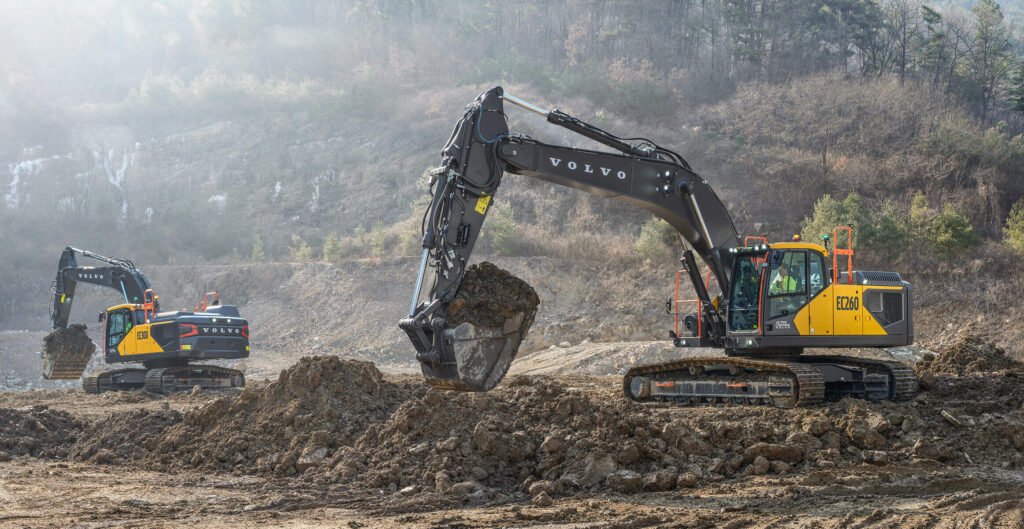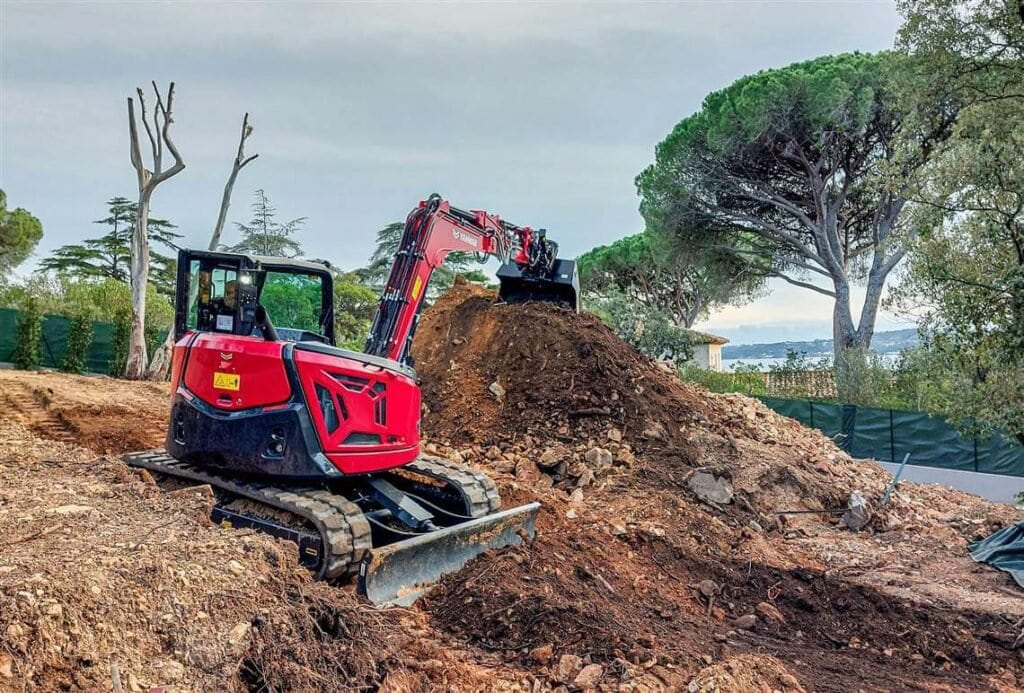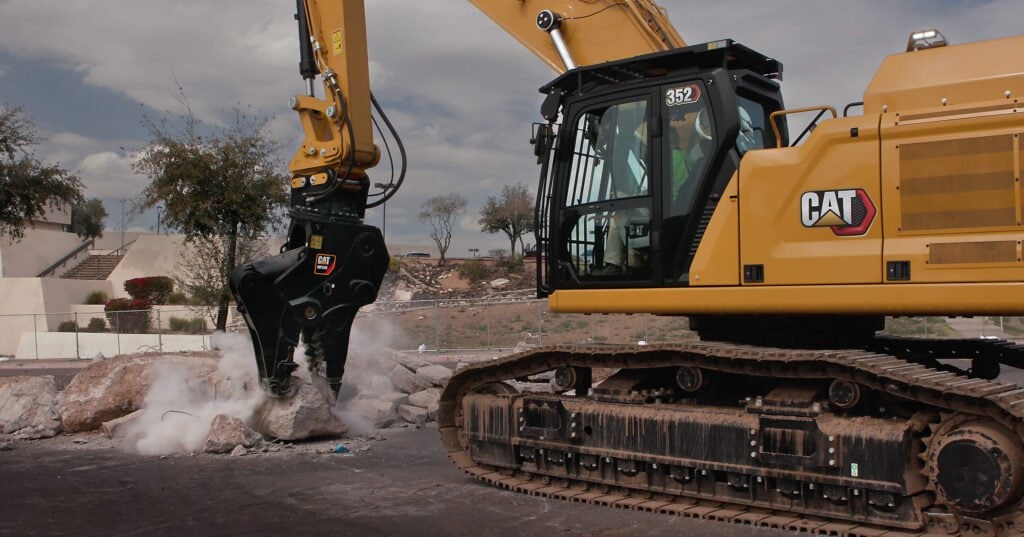If you’ve ever worked on a construction site, then you know how loud it is, especially the excavators. They make it super noisy. Not only is communication tough, but have you considered the health risks of your crews being subjected to that noise all day long? I can not tell you the number of times my crew was supposed to clean a house and instead they “forgot”. It’s hard to blame them though, they couldn’t hear a word I was yelling. It would be challenging to focus on your work if you’re constantly being blasted with noise all day long. Even worse, if your crew is around an excavator all day, they might be permanently damaging their hearing.
The noise isn’t an inconvenience; it’s also a potential safety hazard. All the noise, especially from the excavators, can cause permanent hearing loss, stress, fatigue, and even make it hard for your crew to concentrate. If the noise level continues unnaturally, your workers may suffer long-term health issues, and your overall job site productivity will suffer.
Therefore, understanding the excavator noise levels and knowing how to reduce it can help make sure you have a safe and efficient work environment. That’s what we’re going to talk about today.

1. What Are the Typical Noise Levels of an Excavator?
An excavator makes a lot of noise. Heavy equipment, for example, is almost always off the chart noisy. You need to consider the type of engine, model, machine size, and task at hand to get the actual noise level from an excavator. The noise from an excavator expected between 80 and 110 decibels (dB). The key word is “expected” because these levels can fluctuate based on the working environment, model of machine, and the shape that machine is in.
To give you a clearer idea of what these levels mean in real-world terms:
- 80 dB: This is roughly how loud a loud vacuum cleaner or heavy traffic is. This may not seem exceedingly loud, but prolonged exposure can lead to fatigue or discomfort.
- 90 dB: This is comparable to a blender or the noise level from a lawn mower. This level is definitely louder and can give you minor hearing fatigue after prolonged time without proper hearing protection.
- 100 dB: This is where the noise becomes dangerous, comparable to the sound of a chainsaw or a jackhammer. Extended exposure to this level of noise can have more serious health consequences if workers are not wearing ear protection.
- 110 dB: At this intensity, the noise is like the roar of a rock concert or a thunderclap. It’s extremely loud and can cause significant hearing damage in a very short amount of time without proper protective measures.
It’s crucial to understand that exposure to noise levels above 85 dB over extended periods can lead to permanent hearing damage. This can manifest as noise-induced hearing loss (NIHL), a condition that gradually worsens over time with continued exposure. Even though hearing loss can be gradual, it is irreversible, and workers who experience high levels of noise in their daily tasks are at a significant risk.

Why the Noise Is So High in Excavators
Excavators create such high noise levels because of the power of their engines and hydraulic systems. The engine, responsible for providing power to the machine, is usually a large, diesel-powered engine that is well known to produce a large amount of sound. In addition, the movement of the arm, boom, and bucket requires high pressures in the hydraulic fluid, and this is also a source of noise.
The high-stress environment in which an excavator operates is yet another factor. Excavators are often used for tasks such as digging, lifting, and hauling heavy materials. It takes a lot of power to do these types of things, and the more power the excavator is using, the louder it will be.
The Impact of Excavator Noise on Workers
Prolonged exposure to noise levels above 85 dB can cause a range of negative effects on workers, such as:
- Hearing Loss: The most obvious and severe risk to workers is hearing damage. Prolonged exposure without ear protection can lead to permanent damage to the hair cells in the inner ear, possibly resulting in partial or total hearing loss.
- Tinnitus: A constant ringing or buzzing sound in the ears. It is often caused by prolonged exposure to loud noise and can be debilitating. In many cases, tinnitus is a precursor to permanent hearing loss.
- Increased Fatigue: Exposure to high noise levels. Over time, this can lead to mental and physical exhaustion, making it difficult for workers to maintain focus and energy throughout the day.
- Decreased Communication: Excessive noise makes it difficult for workers to hear important signals and communicate with their peers. This can result in slower operations, raise the risk of accidents, and decrease overall site efficiency.
Regulatory Limits for Noise Exposure
In many countries, occupational health and safety regulations set strict limits on noise exposure for construction workers. For example, the Occupational Safety and Health Administration (OSHA) in the United States recommends a maximum exposure of 90 dB for up to 8 hours per day. If the noise level exceeds this threshold, additional protective measures, such as hearing protection and noise barriers, should be implemented.
By recognizing the typical noise levels associated with excavators and understanding their potential impact on workers’ health and safety, you can take proactive steps to mitigate risks. The key to maintaining a safe work environment lies not just in understanding the noise levels but also in implementing effective strategies to reduce noise exposure and protect your workforce.

2. How Excavator Noise Affects Worker Safety and Health
The noise produced by excavators doesn’t just cause discomfort—it can have serious consequences on both worker health and safety. Understanding how this noise impacts workers is crucial for developing effective mitigation strategies. Here’s how high noise levels from excavators affect workers:
Hearing Loss and Permanent Damage
Continuous exposure to high noise levels can result in temporary and permanent hearing loss, a condition known as noise-induced hearing loss (NIHL). The loud noise generated by excavators, particularly when operating near the engine or hydraulic systems, can cause damage to the delicate hair cells in the inner ear. These hair cells are responsible for transmitting sound signals to the brain. Once damaged, these cells cannot regenerate, leading to irreversible hearing impairment.
The risk of hearing loss increases significantly with prolonged exposure. Even relatively lower noise levels—around 85 dB—can contribute to hearing damage if workers are exposed over extended periods. Most excavators operate well above this threshold, especially when performing tasks like digging, lifting heavy materials, or maneuvering in tight spaces. OSHA recommends that workers wear hearing protection if noise levels exceed 85 dB, and mandatory protection is essential when the noise surpasses 90 dB.
Increased Stress, Fatigue, and Mental Strain
Excessive noise doesn’t just affect the ears; it also takes a toll on a worker’s overall well-being. Prolonged exposure to loud excavator noise can lead to heightened levels of stress, fatigue, и mental strain. The constant bombardment of loud sounds can make it difficult for workers to relax or recover from physical exertion. Over time, this stress accumulates, reducing cognitive functions such as concentration, problem-solving, и decision-making.
When mental alertness diminishes due to fatigue or stress, workers are more prone to human error. This impairment increases the likelihood of mistakes, accidents, and injuries. Workers may misjudge distances or fail to notice hazards around the construction site, leading to dangerous situations that could otherwise be avoided. Additionally, fatigue increases the chances of physical injuries like muscle strain or slips and falls, as the body struggles to cope with both physical and mental exhaustion.

Communication Barriers and Safety Risks
One of the most significant risks associated with loud excavator noise is the communication barrier it creates among workers. In a busy construction environment, where quick communication is critical, noise can make it incredibly difficult to relay important information. Whether it’s instructing a fellow worker on proper safety procedures, signaling to move equipment, or coordinating between supervisors and operators, miscommunication is a key factor in workplace accidents.
When workers cannot hear safety warnings, directions, or machinery signals due to excessive noise, it can result in mistakes or dangerous situations. For example, a lack of communication between an excavator operator and a ground worker can lead to collisions, mishaps with machinery, or even injuries to workers who are in blind spots or not properly shielded.
Moreover, the inability to communicate clearly also contributes to increased stress, as workers become anxious about the possibility of missing critical instructions, signals, or warnings. This leads to reduced productivity as workers feel the need to constantly check for visual cues instead of focusing on their tasks.
Sleep Disturbances and Overall Health
While most workers experience noise exposure during their shifts, some may continue to suffer from the effects of noise after hours. Continuous high decibel exposure, even when workers are off-site, can lead to sleep disturbances, particularly if the noise continues at the worksite or nearby. Sleep is essential for recovery, mental clarity, and overall health. If a worker’s sleep is disrupted due to persistent noise, their performance the following day may suffer, affecting both their physical and mental health.
Research has shown that continuous exposure to noise can increase the risk of cardiovascular diseases, such as high blood pressure and heart disease, due to the prolonged stress it causes on the body. The noise also triggers the release of stress hormones like cortisol, which can have negative long-term effects on health.

Mitigation Measures: Protecting Worker Health and Safety
Understanding the risks associated with excavator noise allows you to implement strategies to protect workers and maintain site safety. Here are several steps you can take to mitigate the impact of noise on your crew:
- Provide Adequate Hearing Protection: Ensure that all workers are equipped with high-quality ear protection (such as earplugs or earmuffs) whenever they are in close proximity to excavators. Regularly assess and replace worn-out ear protection.
- Implement Noise Barriers: Use physical barriers such as soundproof walls or acoustic curtains to help reduce the noise around specific areas of the site. These barriers can help contain loud noises from machinery, especially around high-traffic areas.
- Maintain Excavators Regularly: Regular maintenance of the excavators and other equipment can reduce unnecessary noise. Well-maintained engines and hydraulic systems operate more quietly and efficiently, reducing the strain on workers exposed to excessive noise.
- Schedule Work Strategically: Limit noisy tasks to specific times of the day or in zones where workers are less exposed. For example, schedule louder activities during breaks or shift changes, and alternate tasks so no worker is exposed to high noise levels for too long.
- Provide Training: Educate workers on the risks of high noise exposure and the importance of using hearing protection consistently. Foster a culture of safety, where workers feel comfortable reporting unsafe noise levels.
By being proactive in addressing the risks of noise exposure on your construction site, you not only enhance worker safety and health but also improve productivity and job satisfaction. Noise control isn’t just about meeting regulatory standards—it’s about creating a healthier and safer work environment for everyone involved.

3. What Are the Best Ways to Minimize Excavator Noise Levels on Job Sites?
Reducing the noise from excavators not only improves safety but can also increase overall site efficiency. Here are some of the best ways to minimize excavator noise levels:
a) Regular Maintenance and Equipment Upgrades
Why It Helps: Properly maintained excavators are generally quieter. Make sure your equipment undergoes routine inspections to identify any issues with the engine or exhaust system that may cause excessive noise. Replacing worn-out parts or upgrading to newer, quieter models can also significantly reduce noise levels.
Example: Modern excavators often come with quieter engine technologies and noise-reducing features. If your current fleet is older, consider upgrading to models that are specifically designed to meet noise reduction standards.
b) Use of Mufflers and Sound Insulation
Why It Helps: Installing high-quality mufflers or sound dampening materials on excavators can reduce engine noise. These additions are designed to absorb or deflect sound waves, lowering the overall decibel level emitted by the machine.
Example: Some companies retrofit their excavators with soundproofing materials on the engine covers or undercarriages, further reducing noise exposure for workers nearby.
c) Use of Personal Protective Equipment (PPE)
Why It Helps: While reducing noise at the source is effective, providing hearing protection to your workers is an essential part of noise management. Earplugs or earmuffs designed to protect against high-decibel environments should be worn whenever noise levels exceed safe thresholds.
Example: Ensure that your workers are equipped with high-quality noise-canceling earmuffs, especially when working in close proximity to the excavators. This is often a requirement in high-noise environments and can prevent hearing loss in the long run.
d) Implementing Noise Barriers and Site Layout Adjustments
Why It Helps: Another effective way to manage noise is by installing noise barriers or making adjustments to the site layout. These barriers can be made from materials such as heavy-duty vinyl or acoustic panels and are placed around the work area to reduce the spread of sound.
Example: If your job site is near residential areas or noise-sensitive zones, consider building barriers around the work area or relocating the loudest machines to less sensitive parts of the site. The strategic placement of these barriers can greatly reduce noise exposure to both workers and the surrounding community.

4. What Are the Benefits of Reducing Excavator Noise Levels?
Reducing excavator noise levels offers multiple benefits that positively impact construction sites, workers, and the surrounding community. Here’s why you should consider lowering noise levels:
Improved Worker Health and Safety
Excessive noise can cause hearing loss, fatigue, stress, and even cardiovascular issues. By reducing noise exposure, you can protect workers from long-term health risks, improving their overall well-being and job satisfaction.
Better Productivity and Focus
Loud environments create distractions and hinder concentration. Reducing noise levels helps workers focus, boosting productivity, efficiency, and reducing errors. It also enables clearer communication and fewer accidents, enhancing overall work performance.
Compliance with Regulations
Many regions enforce strict noise limits at construction sites. Failing to comply can result in fines and legal issues. Noise reduction ensures your site remains compliant, helping avoid penalties and safeguarding your company’s reputation.
Enhanced Worker Satisfaction and Site Reputation
A quieter work environment improves morale and helps retain skilled workers. Additionally, reducing noise can foster positive relations with the local community, reducing complaints and enhancing your company’s public image.
Environmental Responsibility
Noise pollution can disturb local wildlife and communities. By managing noise, you contribute to a greener, more sustainable construction process, which is becoming increasingly important for environmentally conscious clients.
In short, reducing excavator noise enhances safety, productivity, and compliance while improving your company’s reputation and community relations. It’s an investment in long-term success.

5. Заключение
Excavator noise levels are a crucial consideration for both worker safety and overall site productivity. By understanding the typical noise levels, the risks involved, and implementing effective noise reduction strategies, you can ensure a safer, more efficient construction environment. Regular maintenance, noise-dampening equipment, and the use of PPE are essential in managing excavator noise. By prioritizing these measures, you not only protect your workers’ hearing but also create a more productive and harmonious work environment. Reducing noise levels on construction sites is not just about compliance—it’s about fostering a safe, healthy, and efficient workplace for everyone involved.